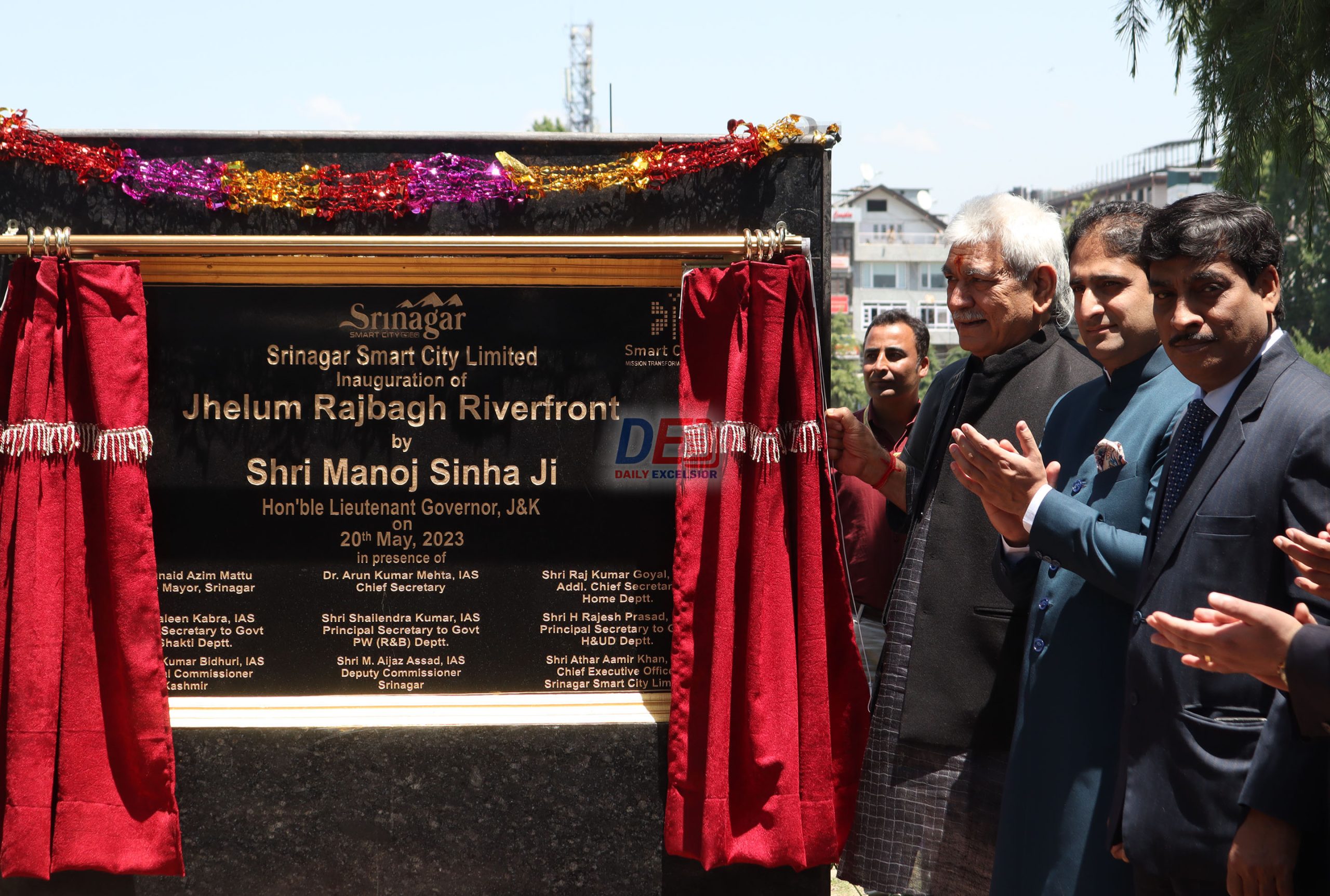Srinagar: While the capital city of Srinagar in Jammu and Kashmir is being decorated with flex boards, murals and flags to welcome the participants of the G20 Working Group meeting, Lieutenant Governor Manoj Sinha on Saturday inaugurated a part of the grand Jhelum Riverfront.
Under Smart City programmes, two riverfronts are being created in the Union Territory of Jammu and Kashmir—one on the river Tawi in Jammu and another on the river Jhelum in uptown Srinagar.
Over 150 guests, including around 60 foreigners, are expected to participate in the G20 Working Group on Tourism conference at Sher-e-Kashmir International Conference Centre on the picturesque banks of Dal Lake on 22-24 May. Most of the guests will be arriving in Srinagar on Sunday and staying at two luxury hotels in the high security zone. Union Minister of Tourism, G. Kishan Reddy, and Minister of State in the Prime Minister’s Office, Dr Jitendra Singh, are expected to attend the conference.
Elaborate security arrangements, with also the involvement of the National Security Guard (NSG) and Marine Commandos (MARCOS), have been put in place even as the security and intelligence agencies have apprehensions of one or two terror strikes aimed at sabotaging the conference. It is for the first time after a cricket match between India and Australia in September 1986, and more significantly for the first time after the withdrawal of Jammu and Kashmir’s special status in August 2019, that a major international conference is being held in Kashmir.
Talking to reporters after inaugurating the riverfront on the River Jehlum at Rajbagh in Srinagar, LG Manoj Sinha said that the entire 6-km long waterfront would be completed under the Smart City mission very soon. “Srinagar is being developed on an international level. Free wi-fi zones, cycle tracks, walkways and cafes will come up shortly. A library will also be opened in the city soon. He added that Srinagar, which is surrounded by water bodies, would be transformed into a smart city in the near future.
About the G-20 event, Sinha said the people and the J&K administration had finalized all arrangements for the upcoming event. “The event will help put the age-old hospitality of Kashmir on display at an international platform. The event will send a message across the globe about Kashmir’s beauty and hospitality which ultimately will result in more tourist arrivals. We are hopeful that the successful G20 event would give a big push to J&K’s economy”, Sinha asserted.
“The riverfront has been designed carefully as a site where local citizens, particularly youths, as well as tourists, can come, walk and cycle. It will be a must visit in Srinagar”, Athar Aamir Khan, Commissioner Srinagar Municipal Corporation and head of the Srinagar Smart City Mission told India Narrative.
The other day only, Sinha also inaugurated the remodelled and refurbished Polo View market on Sherwani Road (Residency Road) on the other side of the river Jhelum. It is now thronged by shoppers, mostly visitors. It is a traditional market of the Kashmiri handicraft including papier mache, crewel and sozni embroidery, Pashmina shawls, curtains and hand knotted carpets.
The riverfront road has been drastically redone. It is now one of Srinagar’s first uniform carriage roads. The underground drainage, parking spaces both on-street as well as off-street have been made. Long walking and cycling spaces have been built. The green spaces, sitting spaces, along with carefully designed lighting and illumination have been done.
The Centrally sponsored Srinagar Smart City Limited (SSCL) has undertaken the initiative to restore the Jhelum Riverfront along Zero Bridge to the historic Budshah Bridge in the first phase with a length of 6 km. The right river bank stretch lies connected with the Central Business District (CBD) through famed market streets. Along the left river bank lies the major residential area of Rajbagh, nestled with numerous institutional establishments.
The Jhelum Riverfront has been envisaged as a continuous walking and cycling promenade along with parks and plazas equipped with public amenities like toilets, seating spaces and high quality lighting.
SSCL has also taken up the project of water transport and the Jhelum Cruise for public transport and leisure. This is designed to restore the city’s old linkage to the river.
Wide pedestrian walkways, universal access and barrier-free environment with ramps, tactile tile lines for the specially-abled, child friendly and interactive spaces, underground electric and telecommunication wiring, modern toilets, plave identification signages, restoration of heritage ghats, improvement of market streets, high-quality lighting, construction of Gazebos and rain shelters, storm water drainage network, development of parking lots and public cycle sharing system with dock stations are some of the features of the Jhelum Riverfront.




















